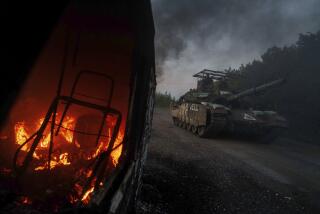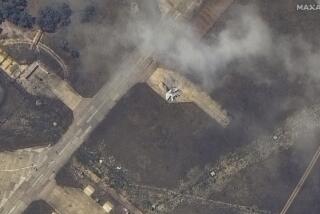Chechens Warned to Flee City or Die
- Share via
MOSCOW — Russian warplanes dropped leaflets Monday on the capital of separatist Chechnya, declaring that the war-torn city is surrounded by troops and warning residents that they must flee by Saturday or die.
The bluntly worded statement threatened that anyone who does not leave the city of Grozny will be deemed a terrorist and will be destroyed in a massive campaign of shelling and bombing.
“You are surrounded,” the leaflet said. “All roads to Grozny are blocked. You have lost. You have no chance of victory. Your commanders do not know what to do next. Further resistance is senseless.”
Russia’s declaration that it has encircled the capital marks a turning point in its 10-week campaign to stamp out Chechnya’s rebel forces. Federal troops, who have moved cautiously to reclaim territory in the breakaway republic, now face the prospect of fighting as many as 5,000 cornered Chechen soldiers. For Russia’s generals, Grozny will be a test of their ability to sustain their military momentum--and their growing political influence.
In addition to the rebel fighters, as many as 40,000 civilians remain in the city, which has been under heavy bombardment for weeks. Citing reports from refugees, New York-based Human Rights Watch said many Grozny residents, particularly the elderly, the poor, the sick and the wounded, have been unable to leave during weeks of bombing by Russian forces.
In Washington, President Clinton stepped up his criticism of Moscow’s handling of the conflict. He urged Russia not to follow through on its threat to kill civilians who do not leave Grozny in time.
“Russia has set a deadline for all inhabitants now to leave Grozny or face the consequences,” Clinton said. “That means that there is a threat to lives of the old, the infirm, the injured people and other innocent civilians who simply cannot leave or are too scared to leave their homes.
“Russia will pay a heavy price for those actions with each passing day, sinking more deeply into a morass that will intensify extremism and diminish its own standing in the world,” Clinton said.
Russia is attempting to retake the republic, which it lost during the costly 1994-96 Chechen war that claimed an estimated 80,000 lives and demonstrated the sorry state of Russia’s armed forces.
This time, Russia has branded the Chechen rebels as “terrorists” and blamed them for bombings of apartment buildings in Moscow and elsewhere in Russia that claimed about 300 lives. The government has yet to offer any proof that Chechens carried out the attacks.
While the first Chechen war was a political disaster that stained the reputation of Russian President Boris N. Yeltsin, the current campaign has given a tremendous political boost to Yeltsin’s latest prime minister, Vladimir V. Putin. Largely because of the war, the former KGB agent is widely perceived as a strong leader who could impose order on a chaotic nation, and a likely successor to Yeltsin.
The Russian military also has gained in stature from the current campaign, in part because it so far has been able to keep casualty figures low. Putin has rewarded the military by increasing its budget, allowing it to use new weaponry in Chechnya and permitting a 27% increase in the number of draftees.
In a sign of the military’s growing political influence, it also has received a free hand from Putin in the conduct of the war--not to mention glowing coverage from much of the nation’s media.
With elections to the Duma, parliament’s lower house, less than two weeks away, the military action has brought surprising unity to the political arena. Nearly all of the major political factions--from the Communist Party to the authors of Russia’s privatization program--have lined up in support of the war. Only the pro-market Yabloko faction, headed by Duma Deputy Grigory A. Yavlinsky, has come out in opposition.
The real measure of the army’s strength, however, is likely to come with its bid to control Grozny. The Chechen capital was the scene of a disastrous defeat for Russian troops when they attempted to storm the city at the end of 1994. This time, Russian military leaders have changed their tactics and say they will not attempt an assault on the city.
It is far from clear, however, whether laying siege to Grozny and bombing it to rubble will be sufficient to defeat fierce and elusive rebel fighters on their home turf.
Although federal forces claim to have blockaded Grozny, Associated Press reported that Chechen fighters could be seen freely moving in and out of the city at night. A reporter for the news agency had no trouble entering Grozny by passing between widely spaced Russian positions.
For the past several weeks, Russian forces have maintained a steady rain of bombs on the city, killing an untold number of civilians and forcing thousands more to flee. Damage has been so heavy that Russian officials are contemplating creating a new capital in nearby Gudermes.
The leaflets dropped on Grozny promised a corridor for the safe passage of civilians who wish to evacuate and for rebels who want to surrender. The backside of some leaflets was printed with a blank pass that residents could fill out to use when evacuating.
After Saturday, the military pledged to intensify the bombardment and kill all those who remain.
“Housing, nutrition and medical care and, the main thing, life, will be given to all who leave Grozny within this time,” the leaflets said. “Persons who remain in the city will be considered as terrorists and bandits. The artillery and aviation will destroy them. There will be no more talks. All those who do not leave the city will be destroyed. The choice is yours to make. The countdown has already begun.”
Russia has rejected pleas from world leaders to negotiate a settlement to the conflict. Foreign Minister Igor S. Ivanov recently said military intervention in the republic was necessary to create conditions for a negotiated solution sometime in the future.
Yeltsin, who was hospitalized Nov. 29 with pneumonia, left the hospital Monday and briefly went to the Kremlin to meet with visiting Ukrainian President Leonid D. Kuchma. Kuchma, who gave his backing to the war, described Yeltsin after their meeting as “energetic” and “cheerful.”
In a surprise announcement, the Kremlin said Yeltsin, 68, will travel to China on Wednesday for brief talks with President Jiang Zemin. Yeltsin’s many health problems have prevented him from traveling during much of his second term as president.
More to Read
Sign up for Essential California
The most important California stories and recommendations in your inbox every morning.
You may occasionally receive promotional content from the Los Angeles Times.













